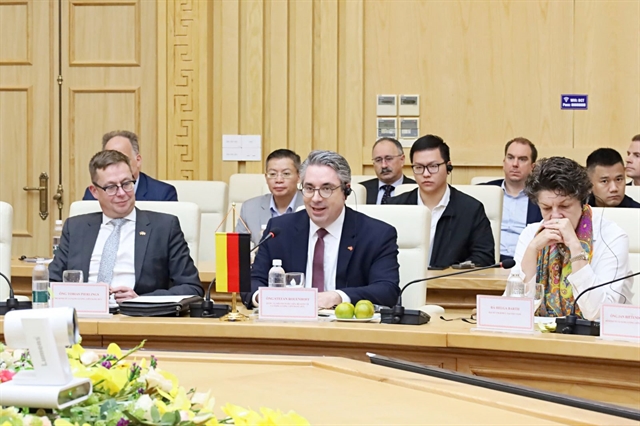 Economy
Economy


|
| Germany’s Parliamentary State Secretary for Economic Affairs and Energy Stefan Rouenho (centre) at the third meeting of the Việt Nam-Germany Joint Committee on Economic and Trade Cooperation. VGP Photo |
HÀ NỘI —Việt Nam’s Deputy Minister of Industry and Trade Nguyễn Sinh Nhật Tân and Germany’s Parliamentary State Secretary for Economic Affairs and Energy Stefan Rouenhoff co-chaired the third meeting of the Việt Nam-Germany Joint Committee on Economic and Trade Cooperation on November 17 in Hà Nội.
The meeting reviewed progress, addressed existing obstacles and identified priority areas for the next phase.
Speaking at the meeting, Deputy Minister Tân said he was pleased to see the rapid growth of the multifaceted partnership between Việt Nam and Germany. He noted that the relationship was strengthened by long-standing friendship between the two peoples, close and practical cooperation between ministries, and deeper ties between the two business communities.
Energy cooperation remained a key pillar. The co-chairs welcomed the upgrade of the partnership to the Việt Nam-Germany Energy Partnership, which will serve as an overarching framework to support energy transition, emissions reduction towards carbon neutrality, energy security and business cooperation.
The two sides agreed to implement the 2025–2026 Action Plan, maintain annual high-level Steering Committee meetings, establish a technical working group and promote training, research, and business connections. Việt Nam highly valued Germany’s role in projects under the Just Energy Transition Partnership (JETP) and called for further cooperation to advance sustainable energy development.
In industry and digitalisation, both sides agreed to expand cooperation in automobile production and to attract more German investment in supporting industries such as textiles, footwear, electronics and high-tech components.
Việt Nam encouraged German chemical companies to take advantage of incentives under the 2025 Law on Chemicals and to cooperate in promoting green chemistry for sustainable growth. The two sides also agreed to enhance technology transfer, innovation and digital transformation in industry, as well as to strengthen training in green skills, digital skills, and Industry 4.0 management.
In trade, Việt Nam and Germany committed to sharing information more actively, maintaining stable trade flows, ensuring smooth supply chains and maximising the benefits of multilateral cooperation frameworks, including the EU–Việt Nam Free Trade Agreement (EVFTA). Việt Nam asked Germany to help its businesses meet market standards, and encouraged German companies to invest in deep processing of agricultural and aquatic products, logistics, cold storage and transhipment facilities for exports to Europe.
At the end of the meeting, Deputy Minister Tân and State Secretary Rouenhoff signed the minutes of the third session of the Joint Committee. The meeting took place in an open, constructive and friendly atmosphere, and both sides agreed to maintain regular sessions to support ministries and businesses in implementing agreed outcomes.
Germany is Việt Nam’s second-largest trading partner in Europe, accounting for more than 17 per cent of Việt Nam’s exports to the EU in 2024. It is also a key gateway for Vietnamese goods into other European markets.
According to the Việt Nam Customs, bilateral trade reached more than US$11.1 billion in the first ten months of 2025, up 15.1 per cent from the same period in 2024. Việt Nam’s exports to Germany rose by 19 per cent to nearly $7.8 billion, while imports increased by 7.2 per cent to almost $3.2 billion.
Around 300 German companies currently operate in Việt Nam, including major industrial groups such as Siemens, B. Braun, Bayer, Mercedes-Benz, Bosch and ZF. In energy, the two countries signed a Joint Declaration establishing their Energy Partnership on July 3, 2025, creating new momentum for cooperation.
As of October 31, 2025, Germany had 509 investment projects in Việt Nam with a total registered capital of over $3 billion, ranking 17th among 153 countries and territories investing in Việt Nam. VNS